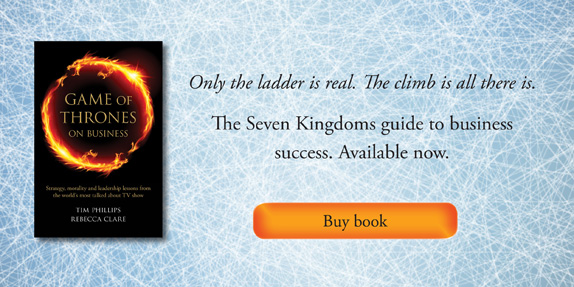Game of Thrones is full of business strategy – if you know where to look
3 May 2016 by Rebecca in Business and finance, Entertainment, Game of Thrones on Business
As our winter draws (reluctantly) to a close we plunge once more into a world where winter is coming, and brings with it sex, intrigue, swordfights, skulduggery and dragons. Unless (or possibly even if) you’ve been living on a wi-fi free desert island for the last five years you will realise we are talking about Game of Thrones, season 6 of which reached our screens this month. The programme makers have been teasing us for several months with what we do and don’t know; what may or may not have happened (yes, we’re talking Jon Snow here). One trailer had Bran declaring that ‘they have no idea what is going to happen’, something that over the years has proven true time and again. We knew the programme was fabulous entertainment right from the start of Season 1 but what we didn’t realise until Ned Stark lost his head was that in this series anything can happen. Bad things will happen to good people, heroes will die, villains will prosper and at no point will we feel this world is safe.
Game of Thrones is possibly the most widely discussed programme on television. With only ten episodes per season it is on our screens for little more than two months out of every year, yet the internet is alive year round with articles on the characters, photographic memes and speculation regarding what’s going to happen next. Why has this programme so inspired us? It has to be in the quality of the storytelling. Compelling characters, a mysterious universe that not even the characters who live in it understand (people thought dragons had died out years ago and nobody believed the white walkers were anything but a myth) and events that frequently extend beyond the protagonists’ control have us perpetually on the edge of our seat. Now, what if we could get people this excited about business?
Business is the dynamic force that shapes our economies and our lives. It’s crucial to the survival of western society as we know it. Business is about progress, wealth creation and opportunity. It should be exciting – fun, even – yet it is frequently discussed and taught in dry and theoretical tomes or through the clumsy medium of presentations reliant on screens of charts and bullet lists. You might not remember every single intricate detail of what happened in the last five seasons of Game of Thrones but we bet you could easily give a rundown of the key highlights. But how much of the last business seminar you attended can you remember? How much of it did you go home and relate to your family or discuss with your friends? How many memes did it generate?

So by bringing the worlds of business and Game of Thrones together we hoped that we could imbue business theory with some of the excitement we feel when we watch the series. Once you take away the dragons and swordfights you start to see more similarities than differences. This strange medieval fantasy kingdom may not look a lot like our world but a lot of its essential ingredients – ambition, deceit, bravery, folly, triumph, disaster – feature in many a news story in the business press. Here are just a few key places where Game of Thrones and business touch.
Nice guys finish last: In the Game of Thrones universe it is not sufficient to be morally right like Ned Stark and his family; one must also be a clever – and lucky – player of the game. The same can be said for business: in this high-stakes world success is not granted simply to those with the best ideas, those who entered the market first or even those who put in the most work. Business, like Game of Thrones, is full of surprises and those who make it to the top do so by not only staying one step ahead of the game but learning to control it rather than having the game play them. Lose focus even momentarily and you lose your advantage. This does not mean you have to be an unprincipled swine to get ahead: the dastardly Petyr Baelish is the exemplary game-player but Daenerys too has demonstrated strategic skill while maintaining a strong moral code.
It’s not what you know but who you know: In Game of Thrones that also includes what you know about them, and how you use it. In business it usually means networking rather than blackmail (though of course that’s not unheard of either). Cersei, Lord Varys and Petyr Baelish all operate networks of people to bring them intelligence on other game players and help them leverage their strategic advantage. So vast is Varys’ network in fact that he is nicknamed the Spider. We all know we need to network more but often only think of it when we need something (a recommendation, a job). But networking is a daily business – Ned Stark left it too late to try to cultivate relationships, staying holed up in Winterfell after the war, and look how well that turned out for him.
You know nothing: Well all right, not nothing, but you rarely have all the information and skills you need to succeed entirely solo. Which is why you need to develop a great team around you. Daenerys has many queenly attributes but she could not have got where she is now without Jorah’s strategic advice, Daario’s muscle, Missandei’s cultural knowledge, or her dragons. A weak spot left unguarded provides an advantage for a rival. Which is why truly successful individuals know themselves well enough to pinpoint their weaknesses and take steps to do something about it.
You win or you die: If you want to succeed you have to be prepared to fail too. But that need not mean taking foolish risks, plunging into the unknown and hoping for the best. Instead you need to follow Baelish’s example and learn how to take calculated risks. Petyr Baelish has been the invisible hand, influencing events, even orchestrating the death of John Arryn, which began the war of the five kings. But at no point has he got those hands truly dirty. He’s always kept at a safe remove from the action – we know he was behind Joffrey’s murder but nobody in the world of the programme could connect him to it. His options are still open and he can pull away from a plan at any time. If you are patient and take incremental, small risks you stand a much better chance of achieving your goals than if, like Renly, Robb or Viserys you insist on going in all guns blazing.
Once you start seeing similarities between Game of Thrones and business it is hard to stop. Next time you have to give a business seminar why not throw in a few examples – it’s almost certain to get you more notice than yet another pie chart, spreadsheet or bullet list.
Game of Thrones on Business by Tim Phillips and Rebecca Clare is available to buy. To be in with a chance to win a free copy, tweet us your top business tip from the show to @Infinite_Ideas

